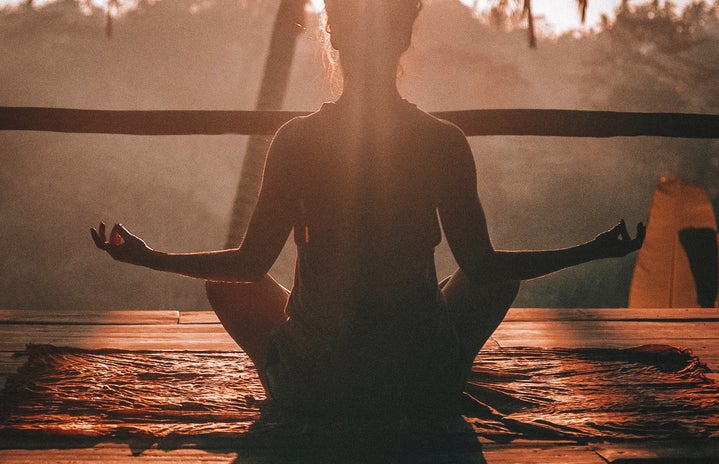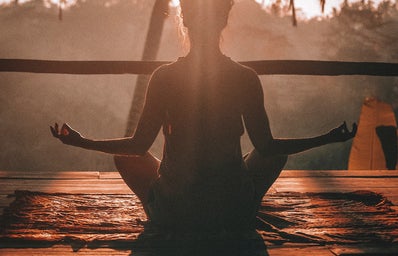Edited by: Mohan Rajagopal
You light your fifth candle of the day, clutch the moonstone around your neck, your bright pink diffuser squirting strawberry-scented ‘peace’ all around you, and bore your eyes into the mirror. “I am happy! I am happy!” You repeat after yourself, “I am enough! I am content!”
The sun is setting now and you realize you’re exhausted because you’ve been up since 5 AM doing yoga, chanting affirmations, and crossing out ridiculously minuscule tasks on your customized to-do list.
“Make things happen!” flashes at you from the metallic sign above your desk, your screen saver thrums with multicoloured posters telling you how powerful you are, how you are the “master of your destiny”.
You close your eyes and exhale, “ommmmm.”
Jesus Christ, you’re hyperventilating now.
The world has fixated on wellness and self-care. Instagram has gulped down the concept of mindfulness and regurgitated it as a breezy yet structured aesthetic, restricted to ridiculously early mornings, endless workouts, overly fibrous diets, and soothing music as the sun slants onto different angles of your perfectly Instagrammable bedroom.
But what is wellness? Beyond the picture-perfect Pinterest mood board version, Merriam Webster defines it as “the quality or state of being in good health, especially as an actively sought goal”.
While this seems innocent enough, the very fact that we actively seek good health and turn it into an achievement adds to the stressful nature of being unstressed. As someone who has fallen prey to this very franchise, I can assure you from personal experience that no matter how many times you tell yourself that “you are the all-powerful creator in this game called destiny”, most days, it’s pretty normal to feel totally out of control.
The pandemic has pried my hands off of any semblance of control I thought I had over my life and most of my relationships. For many, it is this very feeling of no control that has led us down the rabbit hole of absolute temperance.
We start by measuring our meals and doling out times of the day to focus on ‘breathwork’, gradually stretching and contorting our bodies into asanas that don’t always make sense in a well-meaning attempt to make sense of our own contorted reality. Until we realize we’re taking so many structured deep breaths, we’ve forgotten how to breathe. While yoga and meditation and mindfulness are all beautiful things, they should be consumed and practised in moderation. Just like any other drug, this lifestyle of absolute discipline and control can become dangerously addictive.
In my experience, the more we immerse ourselves into the idyllic world of self-care and meditative zen, the higher our resistance becomes to these calming practices, and the more we find ourselves floundering for peace when we are hassled. Maybe it’s just me, but the more I focus on my heartbeat, the rise and fall of my chest as I breathe, the wind on my face, or the crunch of leaves underfoot, the more I feel like my overwrought senses are going to launch into a full-blown panic attack.
By overusing these relaxation techniques, we may end up making them pretty redundant.
There comes a point when too much mindfulness makes you overtly aware and hyper-vigilant; ironically, you may even feel like you are losing your mind.
The second season of ‘Euphoria’ got me thinking that maybe, just maybe, we’d all be better off snorting cocaine and tripping to Labrinth’s latest album. My Instagram feed didn’t help with this revelation as I tried to navigate between the whole Chloe Ting vibe and Rue’s “the only exercise I get is when I’m toting drug money around while riding my bike” vibe.
The glaring extremities that pulled at my psyche left me torn. Neither was making me feel good. The meditation made me feel like I was existing in a sedentary limbo and the other extreme just made me queasy. It wasn’t until I decided to modify and reinvent my version of ‘wellness’ that I actually started to feel like I was ‘well’.
The very notion of wellness is quite simple when you zoom out of the babbling, unrealistic version that the media feeds us. It could be as small as listening to an awesome album or drinking a great cup of coffee or it could be as basic as making it through the day without letting yourself get wrapped up in your head.
If you think about it, life is pretty mundane, and we don’t have to live a romanticised picture-perfect version of it to prove that we are ‘thriving and not surviving ‘. Sometimes, it’s okay to just be. Maybe the Buddha had it right after all. The middle path is the way to go when it comes to wellness.


